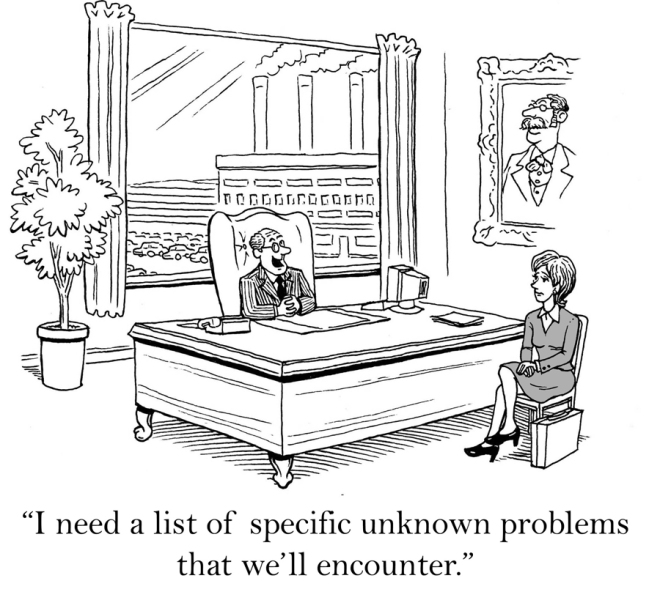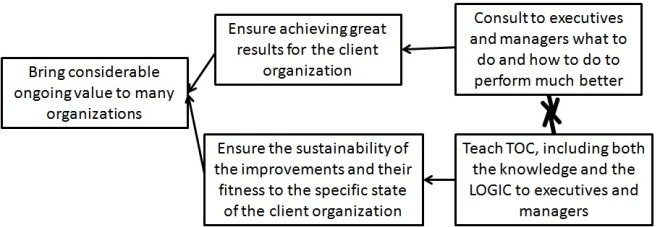
It is natural to joke about consultants. A management consultant is an informal player in the power game within the organization, because he does not belong to the hierarchy. The consultant also does not take any responsibility and only rarely he has real-life experience as a manager.
There are two different types of management consultants. The first consists of those who see their role as facilitators that encourage people to express their views and help them to properly radiate them. These consultants shy away from expressing their own opinion on any subject matter. In this article I do NOT address this type of consultants.
The other type of consultants clearly express very strong opinions. Most of those consultants make a thorough inquiry of the organization needs and then produce a document stating exactly what needs to be done. The big strategic consulting companies, like McKinsey, follow this approach. A different approach is where the consultant comes with certain ideas, but carries a dialogue with the client until a consensus is reached. I believe this is the way TOC consultants should follow.
Why do executives need consultants?
When the consultant is an expert in a very specialized area, like legal consultants or even marketing specialists, then the value is quite clear. While TOC is known mainly in Operations, the TOC BOK covers wide range of managerial areas, thus it cannot be considered specialized in a narrow field. In other words, TOC consultants help the executives of a company to do the job the executive is supposed to do! The emerging problem is that it creates an unfavourable image of an executive who is unable to do his job properly and the TOC consultant has to do it for him.
When the consultant brings new knowledge that cannot be easily gained then there is a certain justification for using him. Question is whether the organization should not expect their executives to be highly knowledgeable on all the areas under their responsibility. In other words, if TOC is not too specialized and yet it is relevant for the management of an organizational function – should not the executives be fluent in the relevant TOC knowledge?
This brings us to a critical conflict within TOC that started way back in the 80s. As I’m preparing myself to a webinar on the development of TOC this conflict is causing me considerable thinking:

In the early days of the Goldratt Institute the idea was just to teach. The real problem was the inability of many clients to quickly implement the general solution advocated in the class, which had caused huge delays in the results leading people to distrust the methodology and coming back to the common flawed methods.
Switching to full consultation, directed at the top management, has achieved results much faster, but, it also showed the problem in keeping the drive to achieve even better results.
I think that the only way to resolve the conflict is to challenge the conflict itself by providing both educating and consulting, not necessarily at the same time, but eventually achieving both.
The focus on consulting also raised the already mentioned problem of the image of managers wasting money on external consultation to do what they need to do in the first place. The big consulting companies deal with that image by offering knowledge on the common practices in similar organizations to establish the “best practices.” The consultants are then viewed as bringing international experience on how recognized issues are dealt by others. So, the ruling assumption is that it is possible, and beneficial, to imitate what others do well and by this achieve results. This generates an explanation how come top executives invite international consulting companies to lead a change, based on benchmarking as a proof for excellence.
Personally I think that benchmarking leads to disastrous results, because they are derived by generic similarities, which do not fully match the map of cause-and-effect, especially the impact of certain unique characteristics that every organization has. On top of that I think that every organization has to build the way to success upon certain unique capabilities, which is quite contrary to benchmarking.
The answer to the image of wasting money to do what management has to do is that external consultants have the ability to bring perspective and ideas from outside the specific business area. The TOC training generates capabilities for identifying the essence of problems and the generic ways to overcome them. TOC is also tuned to identify flawed paradigms, for instance all those that stem from local perspective. This is an ability that even the top best executives cannot easily have, because most of their career they were in the same area and thus have adopted the same set of paradigms that only someone external can see the flaw. Note that when a paradigm that is shared by all competitors is proven invalid in certain aspects the opportunity from the updated paradigm is huge.
There is a related, still different, advantage for an external consultant. An executive, especially the CEO, is quite lonely in his/her hard decision making. Consulting anyone else within the organization has negative ramifications on the image of the executive within the organization. Consulting with an experienced clever consultant answers a basic need. We know that hard decisions mean that undesired outcomes might be caused. This is the nature of living in uncertainty with the various biases that we all carry with us. Discussing the benefits and the negative branches and then how to eliminate the negatives is a real need.
So, what are the requirements from an external TOC consultant to truly deliver value? The TOC formal knowledge can be effectively gained by courses and books. The ability to connect between generic insights, many of them challenge rooted paradigms, and the special characteristics of the organization require critical dialogue between the executives and the consultants. It is never “Do that and that – believe me it’d work”, it is hard thought processing that needs both the internal and the external minds to find the effective solution.
What if the consultant himself feels trapped between the generic ideas and the environment at hand? It should be a common occurrence because the translation of generic ideas to specific environments is never trivial. Think about the possibility of a consultant in a specific project discussing the matter with another consultant, who is not in touch with the specific environment. This is where I believe veterans like me can give value.

Looking forward to the 2 parts of the webinar on the development of TOC.
LikeLike
The company hires the consultant to bridge the gaps (Knowledge and skills that they don’t have.) and everybody (Companies) would like to get the shortcut solution and quick result. All the company compete in the relative velocity that why the company need to benchmark. Eventually, I believe that the goal of Eliyahu Goalratt and Taiichi Ohno is the business excellence (Not only operational excellence: the business excellence occur when the company can outperform the competitor in all organization functions and possess both Resilience and stability.).
LikeLike
‘one shot two rabits’…….
but there is one more question
how to combine two goals in a short time. when they need results and consultant whant to teach.
‘fish’ or ‘rod’?
LikeLike
Very active consulting might be required in the beginning of a project. Later it should, to my mind, include education. The S&T should details the sequence.
LikeLike
Hi Eli, I am having a difficulty with the cloud you are offering. If the objective of D’ is ‘to ensure sustainability of improvements’ (current C) it means that the improvements have already been achieved, probably as the result of prior consulting by the same consultant (current D). Then it means that D and D’ are sequential actions, and not in conflict. And this is the suggested solution that you offer ” I think that the only way to resolve the conflict is to challenge the conflict itself by providing both educating and consulting, not necessarily at the same time, but eventually achieving both.” Also, if ‘consult” (current D) leads to ‘great results’ (current B), while “teach TOC knowledge and logic” puts B (‘great results”) under danger, it would mean that TOC knowledge and logic transferred to the same team of executives in the format of teaching rather than consulting does not include “what to do” and “how to do” (which is the central part of current D). Then what would the knowledge and logic cover?
LikeLike
Hi Jelena, I can see that if one just look at the cloud there is a possibility to misunderstand both D and D’. I hoped that the content of the whole would present the situation as I see it.
First: In the “old days” the idea was to teach without consulting – yes it certainly means not telling specific instructions what to do, just relying on the client to understand and take actions.
What turned out that people who like to know are, many times, not the people who do.
Then came the time for consultants – who teach very little, and certainly do not train. And it works fine, because it is relatively easy for you and me to go to an organization and quickly identify the specific problem and offer the solution. Certainly this is what Goldratt did in so many cases (not all were successful – but that another matter).
Here is the conflict. The management of an organization is aware they are stuck. They have a feeling where the problem lies. they invite you to solve the problem – NOT to teach them the full logic so they can apply it by themselves next time. You teach only what is absolutely necessary, because the solution has to be implemented as soon as possible, and bring results very fast.
There are two negatives coming up:
1. While good and quick results are showing the organization does not ask for anything more. You have good job and that’s it. If the problem, to start with, was in Operations then Operation managers are satisfied and Marketing people are not aware you did anything that is relevant for them. Certainly Finance are not aware of the basic clashes with their management accounting. However, these conflicts are going to make more and more trouble, endangering the implementation and eventually change the whole process back.
2. The organization cannot handle new problems and is not aware there can be addressed and solved following the same logic. They many times consider themselves as “TOC organizations”, but the level of knowledge is small and no new insights emerge.
I think the conflict is real. It starts with what the consultant radiates to the client and what plan is presented. Education takes time and meanwhile no results are showing and it certainly harm the quick fixation of the problem. The solution is not just to start with doing what is urgent and then teach the full scope logic – it is to present that plan in the very beginning. It may look trivial, but in too many cases I have seen, including several of the VV projects, wide scope TOC education was not part of the consultancy plan. It was part of the overall plan, by the way, for Tata Steel, but not much elsewhere.
Once a cloud is resolved it is hard to understand it, as the solution looks so obvious.
LikeLike
Hi Eli, thank you. I am still not clear. When you say “First: In the “old days” the idea was to teach without consulting – yes it certainly means not telling specific instructions what to do, just relying on the client to understand and take actions” – then given that its objective is “Ensure sustainability of improvements” there had to be improvements as the result of teaching, and the improvements had to be of the scale that the consultant would want to sustain them. Then teaching TOC knowledge and logic had to be enough that the client would draw their own correct conclusions about the concrete actions to achieve those very improvements that the teaching was meant to sustain (C). Then how can D’ (“teach TOC”) endanger “great results” in B? And if people that liked to know were not the people who did – how did the improvements come from teaching?
LikeLike
Jelena, it now seems to me we have different basic assumptions about reality. My assumption is that most managers face immediate problems and all they want is to solve them. To my mind most of them do not want to learn anything that is not clearly connected to their immediate needs. So, when you teach them, while the daily problems stay unsolved, they lose faith that eventually the problems will be solved.
So, to my mind, teaching at the initial state reduces the motivation of the organization. I have many stories from my life to show this effect. A simple one is to realize that when we put software, all the users like to know is how to operate the software, and they do not inquire what is the logic and whether it is valid. I have also found out that teaching makes managers understand our suggestions, but it is not enough to make them good in applying it in reality and if something new emerge they lose their comprehension. Actually most of the consultants who went through Goldratt Schools had to be carefully guided – and when left alone they made some critical mistakes.
You may see a somewhat different reality. I just like here to explain the conflict by me claiming that education early in the process slows down the results and reduces motivation. On the other hand, getting the results soon, but without being clear that now, when people are less under pressure, they should study carefully the logic – then we get new managers coming in or conflicts with finance and marketing coming in and all the wrong policies and processes are back.
LikeLike
Eli, I was saying that if D’ is the necessary condition to achieve C, and if D’ is “teach TOC knowledge and logic”, and C is “sustain improvements’, it means that improvements have already been achieved (the verb “sustain” clearly indicates that) and they are not insignificant. If the improvements were achieved through consultancy (D), then I do not see the conflict. It would mean that first due to some activity of the consultant, great results (B) were achieved. Apparently it was NOT through teaching, as teaching endangers this B. Then probably it was consultancy that achieved great results (=improvements). And then the concern comes that if knowledge is not transferred to the company, the improvements that were achieved (current B) will not sustain (the need in current C). You listed the 2 negatives of providing only consulting (D) that speak exactly about that. Then it cannot be that consult vs teach is the conflict from the start of the consultant’s involvement with the company. Did you mean to say that this conflict emerges after the first great results were achieved? The consultant stays with the company, but finds himself in the dilemma whether to stop consulting and move to teaching TOC knowledge and logic to the company or just keep on consulting? Why would there be this dilemma? What would the company of the client expect?
LikeLike
‘Sustain improvements’ does not mean that improvements have already been achieved. C is a necessary condition to achieve the objective in A. The one in conflict has to look for both B and C, where B are predicted improvements in the short term and C looks for sustainability of the improvements. This conflict arises when the initial agreement between the organization and the consultant is settled. Many time the consultant is also the trainer/educator, or he has a partner to deliver education. The conflict is in this initial stage of setting the program for the change.
Jelena, I’m ready to continue the discussion, but can we do it directly by email? WordPress does not keep linkage for such discussions, and the entries of “Recent Comments” in the blog contains only five entries. If we continue the discussion through email and eventually get either agreement of clear areas of agreement and some clear areas of different opinion then we can enter them either as a separate post or as a combined comment. The topic is very important to both of us, but the original post was published about 10 months ago.
LikeLike
Sure Eli, thanks!
LikeLike